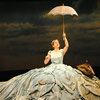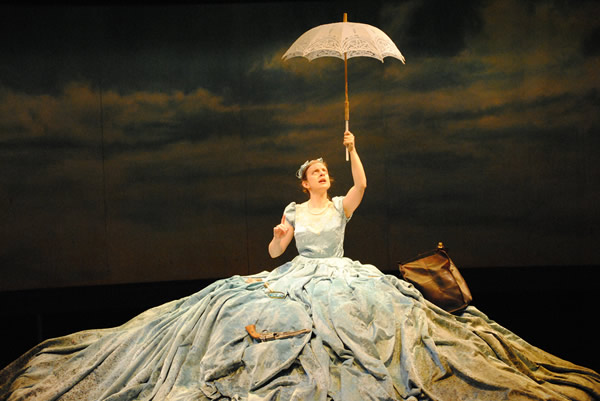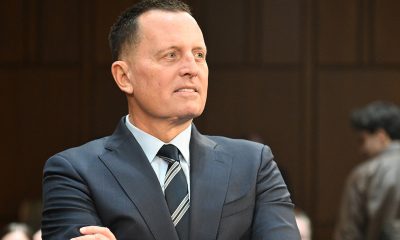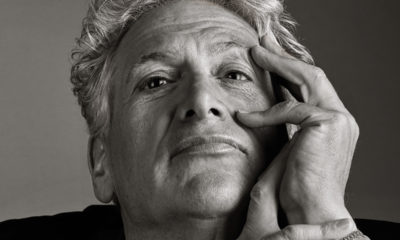Arts & Entertainment
Theatrical highs
Many stellar gay-helmed productions infused D.C. stage scene


Delia Taylor as Winnie in WSC Avant Bard’s production of Samuel Beckett’s ‘Happy Days.’ (Photo by Dru Sefton; courtesy WSC)
It was a particularly good year for Washington theater. Included among the many solid offerings were numerous shows made by and about LGBT people.
Woolly Mammoth presented works by rising gay playwrights Robert O’Hara and Samuel D. Hunter. O’Hara’s autobiographical comedy “Bootycandy,” about growing up black and gay in America, follows the misadventures of young Sutter as he grapples with finding his place in the world and his own burgeoning sexuality. O’Hara — who also directed — led a terrific design team and got some great comedic performances from a talented five-person ensemble who portrayed a much larger number of characters ranging in age, portrayed many more characters ranging in age, sexual orientation and gender.
Hunter’s “A Bright New Boise” is a dark comedy set in the break room of a big box store in Idaho. Woolly’s production was staged by gay director John Vreeke and featured an finely drawn performance from gay actor Michael Russotto.
Leading dramatists were honored. In the spring, Arena Stage celebrated the work of Edward Albee with a festival featuring the gay playwright’s entire canon (mostly staged readings). The festival’s centerpiece were fully staged productions of Albee’s searing domestic drama “Who’s Afraid of Virginia Woolf?” which starred Tracy Letts and Amy Morton as the boozy, battling spouses George and Martha; and Albee’s more recent work “At Home at the Zoo,” a riveting peek into the lives of three New Yorkers.
At the same time, the Georgetown University Theater and Performance Studies Program presented an equally ambitious celebration of another gay playwright’s stunning oeuvre: the Tennessee Williams Centennial Festival (Tenn Cent Fest for short). Included in the extensive, multidisciplinary program was a production of “The Glass Menagerie” featuring Sarah Marshall, who is gay, as the former Southern belle matriarch Amanda Wingfield, who’s based on the playwright’s overbearing mother.
In May, the Kennedy Center presented “Follies” (gay composer Stephen Sondheim’s paean to ex-chorines and messy relationships) starring Bernadette Peters. Staged by local gay director Eric Schaeffer, it was a little uneven but boasted a sublime second act. Since its run here, an improved version of the same production moved on to Broadway and is slated for a limited Los Angeles run in the spring.
At Synetic Theater, gay actor Philip Fletcher continued to do amazing things with his body during 2011. A longtime regular with the movement-based theater group, Fletcher played Edmund in a stunning, punk rock “King Lear” in April, and in October he reprised his role as the most maniacal third of a triadic Iago in “Othello.”
At WSC Avant Bard in Rosslyn, director Jose Carrasquillo directed Delia Taylor (both gay) in a splendid production of Samuel Beckett’s daunting “Happy Days.” Tony Cisek — also gay — designed the set. In fact, Cisek designed sets for many productions throughout the year including Ford’s “Parade,” Folger’s “Othello” and “After the Fall” at Theatre J.
Other news from 2011: The Shakespeare Theatre Company’s gay artistic director Michael Kahn celebrated 25 years at the troupe’s helm; legendary (and lanky) Broadway choreographer Tommy Tune came to town to accept the Helen Hayes Tribute for an exceptionally successful career in theater; award-winning local actor Holly Twyford (who is gay) made an impressive directing debut at No Rules Theater Company with “Stop Kiss.” On a sadder note,Ganymede Arts, Washington’s only gay-specific theater closed, citing straightened finances as the main reason. The company was known for successfully staging works of special interest in LGBT audiences and for four years, it held fun fall arts festival, which attracted cool notables like Karen Black, Charles Busch and Holly Woodlawn.
For Helen Hayes Award-winning actor and DC theater scene veteran Rick Hammerly, 2011 was an especially busy and professionally fulfilling year. In addition to acting in the Kennedy Center’s long-running “Shear Madness,” the Tenn Cent Festival’s “And Tell Sad Stories of the Deaths of Queens…,”and most recently as Mr. Fezziwig in “A Christmas Carol” at Ford’s Theatre, he also produced “Magnificent Waste” for Factory 449, a progressive theater company that he and a small group of other theater artists founded several years ago.
And in what Hammerly describes as the highlight of his year, he staged a timely production of “Dead Men Walking” at American University in the fall. The play was created for universities by Tim Robbins through his Dead Man Walking School Theatre Project. It closely follows Robbins’ 1995 award winning film adaptation of the book by Sister Helen Prejean, based on her time spent with Death Row inmates.
“The experience gave me the opportunity to introduce the students to the power of theater — what it can really accomplish if you’re tackling things that are current. We used the story of Troy Anthony Davis’ execution in the play to tie what’s taking place on stage to something that is actually happening in the world. It demonstrated the strength of art and theater.”
Theater
‘Bad Books’ a timely look at censorship in local library
Influencer vs. conservative parent in Round House production

‘Bad Books’
Through May 4
Round House Theatre
4545 East-West Highway
Bethesda, Md.
Tickets start at $43
Roundhousetheatre.org
While a library might seem an unlikely place for a heated contretemps, it’s exactly the spot where adults go when they’re itching to battle out what books minors might be allowed to read.
In Sharyn Rothstein’s “Bad Books,” two women, The Mother (out actor Holly Twyford) and The Librarian (Kate Eastwood Norris), swiftly become mired in a quarrel that comes with some weighty repercussions.
The Mother is a popular conservative influencer on a mission. She’s furious that the local library has overstepped its bounds and she blames The Librarian, a woman who adheres to the “it takes a village” method of child rearing and is dedicated to the young people who approach her reference desk.
There’s some background. It seems The Librarian who dresses young (tight jackets and Doc Martens) and curses a blue streak, forged a friendship with Jeremy, a teenage library regular.
While the details are a bit hazy, it seems the troubled Jeremy confided in The Librarian regarding some personal issues. In return, she suggested a helpful book – Boob Juice.
Unsurprisingly, based solely on its title, the book has thrown The Mother into a pique of outrage. After finding Boob Juice in her son’s bedroom, she made a beeline to the library; and not incidentally, The Mother hasn’t read the recommended work and has no plans to do so.
Set in a suburb with lax gun laws, the story explores facets of division and conciliation. The Mother insists she isn’t so much about banning books as she is keeping some books away from young people until they’ve obtained parental approval.
“Bad Books” is performed in the round. Built on a rotating stage, Meghan Raham’s set is simple, pleasingly serviceable, and easily transforms from the library into a small corporate office, and later the assembly room of a church. Overhead floats a circular glass shelf filled with a cache of banned books. Things like a rolling book cart and a goldfish bowl add some flavor to the different locations.
The Mother wasn’t always a popular conservative warrior with an enthusiastic horde of followers.
Her past includes penning a book that later filled her with guilt and regret. She refers to that early questionable literary accomplishment as her bad book. And while over the years, she has persevered to find and destroy each and every printed copy, she hasn’t entirely succeeded.
Norris plays three women who figure meaningfully into the arc of Twyford’s mother character. In addition to The Librarian, Norris is The Manager, a broadly played piece of comic relief, and The Editor, a warm woman who reveals things about Jeremy that his own mother never knew.
Smartly staged by Ryan Rilette, the production is part of a National New Play Network Rolling World Premiere. While Rothstein’s script offers two strong roles (skillfully performed by celebrated actors Twyford and Norris), its ending feels too neatly resolved.
In the past, Twyford and Norris have successfully joined forces for numerous DMV productions including Studio Theatre’s production of David Auburn’s two-hander “Summer, 1976,” the story of a longtime and unlikely friendship between two women who meet as young mothers during the Bicentennial summer.
Though different, both The Librarian and The Mother share a strong and ultimately hopeful relationship with words.
There’s a quote from E.B. White’s classic “Charlotte’s Web” that pops up a couple of times in the briskly paced 80-minute play. Charlotte, the wise spider, says, “with just the right words you can change the world.”
Books
‘Pronoun Trouble’ reminds us that punctuation matters
‘They’ has been a shape-shifter for more than 700 years

‘Pronoun Trouble’
By John McWhorter
c.2025, Avery
$28/240 pages
Punctuation matters.
It’s tempting to skip a period at the end of a sentence Tempting to overuse exclamation points!!! very tempting to MeSs with capital letters. Dont use apostrophes. Ask a question and ignore the proper punctuation commas or question marks because seriously who cares. So guess what? Someone does, punctuation really matters, and as you’ll see in “Pronoun Trouble” by John McWhorter, so do other parts of our language.

Conversation is an odd thing. It’s spontaneous, it ebbs and flows, and it’s often inferred. Take, for instance, if you talk about him. Chances are, everyone in the conversation knows who him is. Or he. That guy there.
That’s the handy part about pronouns. Says McWhorter, pronouns “function as shorthand” for whomever we’re discussing or referring to. They’re “part of our hardwiring,” they’re found in all languages, and they’ve been around for centuries.
And, yes, pronouns are fluid.
For example, there’s the first-person pronoun, I as in me and there we go again. The singular I solely affects what comes afterward. You say “he-she IS,” and “they-you ARE” but I am. From “Black English,” I has also morphed into the perfectly acceptable Ima, shorthand for “I am going to.” Mind blown.
If you love Shakespeare, you may’ve noticed that he uses both thou and you in his plays. The former was once left to commoners and lower classes, while the latter was for people of high status or less formal situations. From you, we get y’all, yeet, ya, you-uns, and yinz. We also get “you guys,” which may have nothing to do with guys.
We and us are warmer in tone because of the inclusion implied. She is often casually used to imply cars, boats, and – warmly or not – gay men, in certain settings. It “lacks personhood,” and to use it in reference to a human is “barbarity.”
And yes, though it can sometimes be confusing to modern speakers, the singular word “they” has been a “shape-shifter” for more than 700 years.
Your high school English teacher would be proud of you, if you pick up “Pronoun Trouble.” Sadly, though, you might need her again to make sense of big parts of this book: What you’ll find here is a delightful romp through language, but it’s also very erudite.
Author John McWhorter invites readers along to conjugate verbs, and doing so will take you back to ancient literature, on a fascinating journey that’s perfect for word nerds and anyone who loves language. You’ll likely find a bit of controversy here or there on various entries, but you’ll also find humor and pop culture, an explanation for why zie never took off, and assurance that the whole flap over strictly-gendered pronouns is nothing but overblown protestation. Readers who have opinions will like that.
Still, if you just want the pronoun you want, a little between-the-lines looking is necessary here, so beware. “Pronoun Trouble” is perfect for linguists, writers, and those who love to play with words but for most readers, it’s a different kind of book, period.
The Blade may receive commissions from qualifying purchases made via this post.

Friday, April 18
“Center Aging Friday Tea Time” will be at 2 p.m. on Zoom. This is a social hour for older LGBTQ+ adults. Guests are encouraged to bring a beverage of choice. For more details, email [email protected].
Go Gay DC will host “LGBTQ+ Community Social in the City” at 7 p.m. at Hotel Zena. This event is ideal for making new friends, professional networking, idea-sharing, and community building. This event is free and more details are available on Eventbrite.
Trans and Genderqueer Game Night will be at 6 p.m. at the DC Center for the LGBT Community. This will be a relaxing, laid-back evening of games and fun. All are welcome and there’ll be card and board games on hand. Feel free to bring your own games to share. For more details, visit the DC Center’s website.
Saturday, April 19
Go Gay DC will host “LGBTQ+ Community Brunch” at 11 a.m. at Freddie’s Beach Bar & Restaurant. This fun weekly event brings the DMV area LGBTQ+ community, including Allies, together for delicious food and conversation. Attendance is free and more details are available on Eventbrite.
LGBTQ People of Color Support Group will be at 7 p.m. on Zoom. This peer support group is an outlet for LGBTQ People of Color to come together and talk about anything affecting them in a space that strives to be safe and judgement free. There are all sorts of activities like watching movies, poetry events, storytelling, and just hanging out with others. For more information and events for LGBTQ People of Color, visit thedccenter.org/poc or facebook.com/centerpoc.
“Spark Sapphic Social” will be at 8 p.m. at Spark Social House. This weekly sapphic social is an opportunity to mix and mingle with other sapphics in D.C.’s newest LGBTQ bar. This event is free and more details are available on Eventbrite.
“DC Drag Brunch on Rooftop – Penthouse (Formerly at Lima Twist)” will be at 12 p.m. at Baby Shank Rooftop. Hosted by Miss Capital Pride, this is the ultimate drag brunch experience in Washington, D.C., featuring the fiercest queens around. Prepare to be entertained by glamorous drag queens and celebrated celebrity impersonators, including Taylor Swift, Lady Gaga, Beyoncé, Britney Spears, Nicki Minaj, Ariana Grande, Whitney Houston, Cher and many more. Tickets cost $27 and are available on Eventbrite.
Sunday, April 20
Queer Crayon Club will host “Queer Sketch Social” at 3 p.m. at Sinners and Saints. This is a fun event for LGBTQ+ adults to come together and color. Attendance is free and more details are available on Eventbrite.
Monday, April 21
“Center Aging Monday Coffee & Conversation” will be at 10 a.m. on Zoom. This is a social hour for older LGBTQ+ adults. Guests are encouraged to bring a beverage of choice. For more details, email [email protected].
Tuesday, April 22
Genderqueer DC will be at 7 p.m. on Zoom. This support group is for people who identify outside of the gender binary. Whether you’re bigender, agender, genderfluid, or just know that you’re not 100% cis – this is your group. For more details, visit www.genderqueerdc.org or Facebook.
Coming Out Discussion Group will be at 7 p.m. on Zoom. This is a peer-facilitated discussion group and a safe space to share experiences about coming out and discuss topics as it relates to doing so. For more details, visit the group’s Facebook.
Wednesday, April 23
Job Club will be at 6 p.m. on Zoom. This is a weekly job support program to help job entrants and seekers, including the long-term unemployed, improve self-confidence, motivation, resilience and productivity for effective job searches and networking — allowing participants to move away from being merely “applicants” toward being “candidates.” For more information, email [email protected] or visit thedccenter.org/careers.
Asexual and Aromantic Discussion Group will be at 7 p.m. on Zoom. This is a space where people who are questioning this aspect of their identity or those who identify as asexual and/or aromantic can come together, share stories and experiences, and discuss various topics. For more details, email [email protected].
Thursday, April 24
Virtual Yoga with Sarah M. will be at 7 p.m. on Zoom. This is a free weekly class focusing on yoga, breath work, and meditation. For more details, visit the DC Center for the LGBT Community’s website.
DC Anti-Violence Project Open Meeting will be at 7 p.m. on Zoom. This meeting is open to anyone interested in learning more and getting involved in lessening violence both within and directed towards the LGBT communities. For more information, visit Facebook or Twitter.
-

 U.S. Federal Courts4 days ago
U.S. Federal Courts4 days agoFederal judge blocks Trump passport executive order
-

 Obituary5 days ago
Obituary5 days agoLocal attorney, LGBTQ rights advocate Dale Sanders dies at 75
-

 Mexico5 days ago
Mexico5 days agoGay couple claims Puerto Vallarta wedding venue discriminated against them
-

 Books4 days ago
Books4 days ago‘Pronoun Trouble’ reminds us that punctuation matters












